The Democratic Party

Founded by a Slave Holder/Trader, Thomas Jefferson
The Democratic Party

Founded by a Slave Holder/Trader, Thomas Jefferson
The Democratic Party was founded in 1794 as a Congressional Committee to oppose the dominant party of the time, called the Federalists. As with most parties of its time, the Democratic Party endorsed Slavery. To date, the Democratic Party has never officially apologized for promoting slavery in its platforms - and doesn’t plan to!!
The Republican Party

Founded by men and women who hated slavery
The Republican Party was founded in Ripon, Wisconson in 1854 as a protest organization to Slavery - also known as that “peculiar institution of the South”. They insisted on pushing the country to war over the issue, selecting Abraham Lincoln as their first Presidential candidate. The next group whose freedoms that the Republican Party had to fight for was women’s right to vote (the 19th Amendment).
The Confederacy
 |
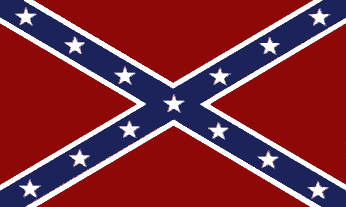 |
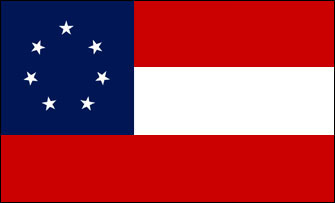 |
|
First National Flag of the Confederacy, called "Stars and Bars"
|
National Confederate Battle Flag
|
Last National Flag of the Confederacy
|
The Confederacy was a group of Democrat Party controlled Southern States who decided, in the late 1800's, to formally leave the “Union” of the United States over the issue of the enslavement of Black people. Confederate Flags were designed very similar to ours. The “Stars and Bars” (pictured on the left) was the first national flag of the Confederacy. The Confederate Battle Flag (pictured on the right) is the most popular and enduring symbol of the Confederacy. This flag is very popular among Democratic Party members and still flies over State Capitals of former confederate states (such as Mississippi) to this day. Some of the highlights of the Constitution of the Confederates States are:
No bill of attainder, ex post facto law, or law denying or impairing the right of property in negro slaves shall be passed.
The citizens of each State shall be entitled to all the privileges and immunities of citizens in the several States; and shall have the right of transit and sojourn in any State of this Confederacy, with their slaves and other property; and the right of property in said slaves shall not be thereby impaired. In all such territory the institution of negro slavery, as it now exists in the Confederate States, shall be recognized and protected by Congress and by the Territorial government; and the inhabitants of the several Confederate States and Territories shall have the right to take to such Territory any slaves lawfully held by them in any of the States or Territories of the Confederate States.
The Confederacy's first president was prominent Democrat, Jefferson Davis who led the Confederacy into the Civil War with the “northern agressors”. The Northerners were led by Republican President Abraham Lincoln. If the Democrats had won the Civil War, Blacks would still be the property of Confederate Democrats.
Robert C. Byrd
Democrat
United States Senator, West Virginia
Former member, Ku Klux Klan
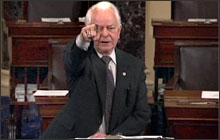
Senator Byrd is the only current elected member in the United States government that was a member of the KKK. Not only was he a member, Senator Byrd was a Kleagle (the official recruiter and chief advisor for the Ku Klux Klan). He has never apologized for his membership nor is there any public record of his official resignation from that Democratic terrorist organization. Senator Byrd has never voted for a Black person to serve on the United States Supreme Court and does not support Reparations for Blacks. Byrd voted against every anti-lynching legislation and Civil Rights Legislation that came to the floor of the Senate until he became Senate Majority Leader in the 1970's.
When Democrats become a majority in the Senate, Byrd customarily is selected by his colleagues as the Senate President Pro Tem. This position is largely ceremonial with one exception - that position makes Senator Byrd 3rd in line in succession to the Presidency! Yes - the Democrats routinely elect a Klansman who could possibly become President!
Ku Klux Klan Invisible Empire
Democratic Party Terrorist Organization

The Ku Klux Klan is a Terrorist Organization formed by six Democratic Party members who were army officers in the Confederate Military. The Klan founders were: Calvin E. Jones, John B. Kennedy, Frank O. McCord, John C. Lester, Richard R. Reed, and James R. Crowe. These men were from well-known Democrat families.
They organized the Klan in Pulaski, Tennessee, on December 24, 1865. Many other Democrats who were demoralized by the Republican “Union” victory of the Civil War joined the Klan. In May of 1866 Nathan Bedford Forrest, a Democrat, former slave trader, and former confederate army general, joined the Klan.
Forrest's membership in the Klan encouraged many other diehard Democrats to join this group of terrorists. The Klan's actions were directed against Republicans, governments under Reconstruction, blacks, and their white sympathizers. Forrest was soon named the first Grand Dragon of the Ku Klux Klan.
In 1867, at the Maxwell House Hotel (also famous for its private blend of coffee called “Maxwell House” coffee) a secret meeting of Klansmen met and reorganized the Klan. They adopted a new constitution and planned their terrorist efforts for the next four years. They changed their name from just the “Ku Klux Klan” to the “Ku Klux Klan
Invisible Empire”. From 1867 to about 1871, they raped, murdered, flogged, castrated, branded, and shot thousands of innocent people. The Klan became the primary instrument of the Democratic Party to destroy Reconstruction efforts in the South and re-establish Democratic white supremecy in the South for almost the next 100 years.
Albert Arnold Gore, Sr.
Democrat
Former U.S. Senator, Tennessee
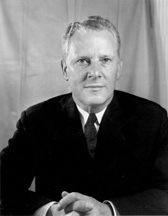
Senator Albert Gore, Sr. was one of many very powerful segregationist polititians. Senator Gore, Sr. was the father of U.S. Vice President Albert Gore, Jr. (Al Gore, Jr. also served as U.S. Senator from Tennessee). Senator Gore, Sr. was a leader in the 74 day filibuster against the Civil Rights Act of 1964. Republicans rescued the legislation by providing the necessary votes to end the filibuster and pass the Civil Rights Act of 1964. Outraged by the passage of the Civil Rights Act of 1964, Senator Gore, Sr. proposed an amendment to the Act that would have kept federally funding schools that ignored court desegregation orders. It was defeated by a vote of 74-25. 23 Democrats and 1 Republican voted for it.
“I'm proud of the choices you made. I'm proud of the road you took. I'm proud of your courage, your righteousness, and your truth... Dad, your whole life has been an inspiration.
Then Vice President, Gore Jr.'s closing comments of his Eulegy of his Father, the Segregationist Tennessee Senator, Al Gore Sr.
Earnest Fredrick “Fritz” Hollings
Democrat
United States Senator, South Carolina
Former Governor of South Carolina
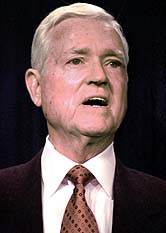
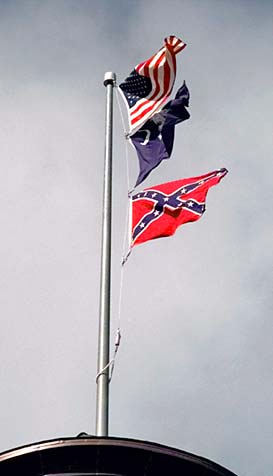
Senator Hollings has a past that is repleat with segregation, racism, and pro-slavery activity. Governor Hollings signed the resolution to fly the Confederate Battle Flag over the South Carolina Capital back in March of 1962. The NAACP has been organizing protests against Republicans for the actions of this Democrat. Hollings is still serving as a U.S. Senator from South Carolina.
J. William Fulbright
Democrat
United States Senator, Arkansas
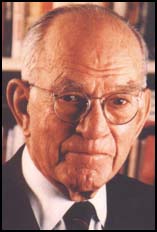
Senator James William Fulbright (of the scholarship fame) was a segregationist and racist. The highlights of his career included his votes against the 1964 Civil Rights Act and against the 1965 Voting Rights Act. He also signed the Southern Manifesto (a formal protest signed by Southern Democrats against the Brown v. Board of Education decision by the U.S. Supreme Court). Fulbright was even part of a southern senate causus called the “Southern Bloc”. Its purpose was to block passage of any and all anti-lynching legislation, civil rights legislation, and bills prohibiting the use of poll taxes and black codes.
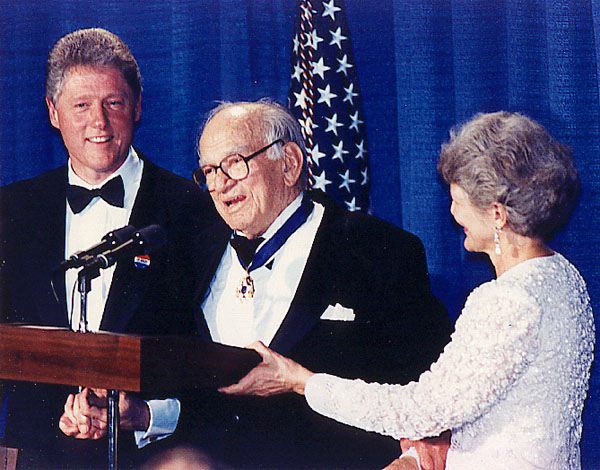
Former U.S. President Bill Clinton was proud to call Fulbright his mentor. On May 5, 1993, then President Bill Clinton presented the Presidential medal of freedom to Fulbright. The Presidential Medal of Freedom is the highest Civilian award in the United States. This award is the highest “thank you” from the United States to those who have dedicated their lives toward making the U.S. a better place to live.
William Jefferson Clinton
Democrat
Former President, United States of America
Former Attorney General & Governor, Arkansas
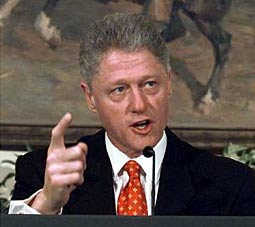
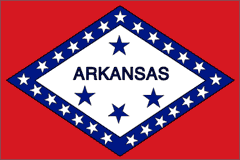
“The First Black President” (Affectionately named by Nobel Laureate for Literature, Mrs. Toni Morrison) has racist and discriminatory skeletons in his closet. At age 20, young Bill interned with segregationist, J.W. Fulbright. During Clinton's 12 years as Governor, he had lost cases accusing him of voter fraud against Blacks and violating the 1965 Voting Rights Act. Clinton routinely tried to overturn elections of Black of- ficials such as Ben McGee (in favor of white Democrats) only to be overturned himself by the U.S. Supreme Court. As President, Clinton called racial profiling “morally indefensible, deeply corrosive practice”. However, he was fighting cases in order to preserve racial profiling in Arkansas as Governor. Highlights of his Gubernatorial reign was to sign two major pieces of legislation into law. One is Act 985 of 1985 officially designated January 19th as Robert E. Lee Day (the famous General of the Confederacy). The other is Act 116 of 1987 which designated the star immediately above the name “Arkansas” on the State's flag to celebrate Arkansas' past as a Confederate Slave State. During the Clinton Presidential Administration, 225,000 more Blacks were incarcerated then under the Reagan Administration. Ex-President Bill Clinton has attended places that discriminate against Blacks (i.e. Indian Creek Country Club). In recognition of Clinton's career, the Arkansas Black Hall of Fame inducted him as an honorary member. He is the first non-Black to be inducted in the entire history of the organization.
George Wallace
Democrat
Former Governor, Alabama
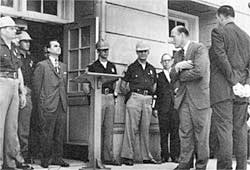
Today I have stood, where once Jefferson Davis [President of The Slave-owning Confederate States of America] stood, and took an oath to my people. It is very appropriate then that from this Cradle of the Confederacy, this very Heart of the Great Anglo-Saxon Southland, that today we sound the drum for freedom as have our generations of forebearers before us done, time and time again through history. Let us rise to the call of freedom-loving blood that is in us and send our answer to the tyranny that clanks its chains upon the South. In the name of the greatest people that have ever trod this earth, I draw the line in the dust and toss the gauntlet before the feet of tyranny . . . and I say . . .
Segregation Today...
Segregation Tomorrow...
Segregation Forever!!
Governor George Wallace's 1963 Inaugural Speech
The above photo was taken on June 11, 1963. Wallace is standing at the door of Foster Auditorium at the University of Alabama in Tuscaloosa. He tries to block the admission of two Black students (Vivian Malone and James Hood). Second from right is Nicholas Katzenbach, Deputy Attorney General of the U.S.
Orval Eugene Faubus
Democrat
Former Governor, Arkansas
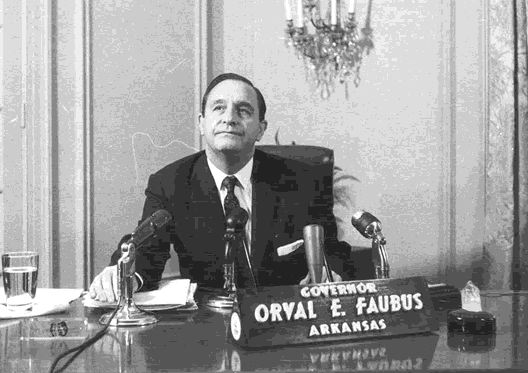
A staunch segregatioist, Faubus used the Arkansas National Guard to block the entrance of nine Black students into Little Rock's Central High School. When Faubus ordered the National Guard to block the nine students from entering the school, Republican Dwight Eisenhower federalized the Arkansas National Guard and ordered them back to their barracks. Republican Dwight Eisenhower followed up with sending elements of the U.S. Army's 101st Airborn Division to protect the entrance of these students into the school. Although the students faced an angry mob, they did enter Little Rock Central High School safely.
Ross Robert Barnett
Democrat
Former Governor, Mississippi
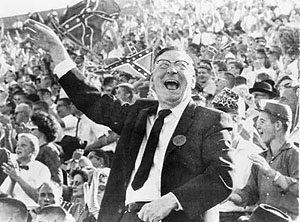
Ross Barnett was the son of a Confederate soldier. Barnett and the government of Mississippi physically blockaded federal authorities for seventeen days from assisting a Black man - James H. Meredith - from entering to the University of Mississippi at Oxford, Mississippi. On September 30, a deal to allow Meredith to register was made between U.S. Attorney General Robert Kennedy and Barnett. A federal plane flew Meredith to the campus from Memphis, Tennessee. Meredith was joined by U.S. Deputy Attorney General Nicholas Katzenbach and driven to the campus in a convoy of automobiles. Next, he was transported secretly to Baxter Hall, where he spent the night alone until the next day. Deputy federal marshals, U.S. border patrolmen, and federal prison guards, were stationed on and around the campus to protect him. The next day, seemingly all of Mississippi heard that Meredith was on campus. More than a thousand students violently shouted they hated President Kennedy and to kill the “nigger-loving bastards.” The mob later threw bottles and rocks, forcing State troopers to flee. Outnumbered federal marshals were left alone. The marshals tried to hold off the mob with tear gas but were attacked brutally with about 160 of them injured (82 wounded were shot), and two killed. This act of violence did not cease until federal troops arrived. On the morning of October 1, 1962, James Meredith registered at Ole Miss. Meredith would go on to finish his education at the university and graduate in 1964.
Hugo Lafayette Black
Democrat
Former Associate Justice, U.S. Supreme Court
Former U.S. Senator, Alabama
Lifetime Member, Ku Klux Klan
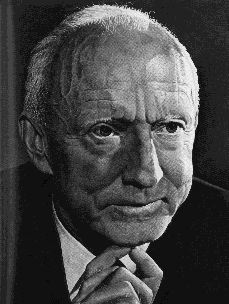
On September 13, 1923, after he became a lawyer in Birmingham, Alabama, Black joined the Ku Klux Klan with a lifetime membership. Black marched in parades and spoke in meetings. Black was an excellent attorney for the Klan. In 1924, when U.S. Senator Oscar W. Underwood from Alabama denounced the Ku Klux Klan, Black noticed a career opportunity. Black campaigned for that Senate seat, addressing nearly all the 148 Klan Klaverns in Alabama. Black won. Black later acknowledged that he owed his victory to the Klan. As a U.S. Senator, Black filibustered and voted against anti-lynching bills, civil rights bills, and any other piece of legislation that sought to make life better for Black Americans. After about 11 years in the U.S. Senate, Black was appointed to serve as Associate Justice of the United States Supreme Court by Democrat President Franklin Delano Roosevelt (FDR). FDR appointed Black in full knowledge of Black's Klan affiliation. In 1965 he voted to uphold the constitutionality of poll taxes. Hugo Black died in 1971 a champion of the Democratic Party.
Theophilus Eugene “Bull” Connor
Democrat
Public Safety Commissioner of Birmingham
Alabama House of Representatives
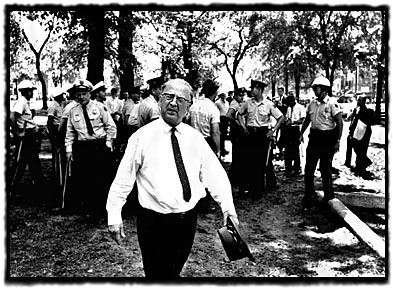
Connor was elected Public Safety Commissioner of Birmingham in 1937, a position that gave him administrative authority over the city's police and fire departments. “Bull” Connor is most famous for his staunch defense of racial segregation and for ordering the use of police dogs and fire hoses to disperse civil rights demonstrators in Birmingham during the spring of 1963.
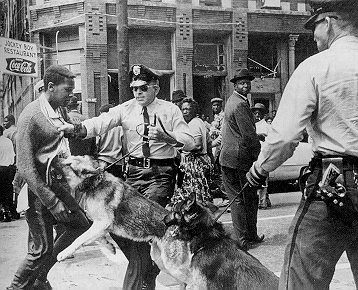
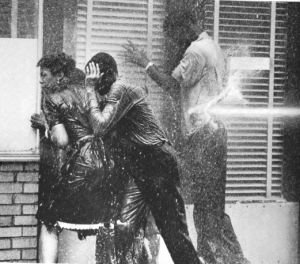
“We Shall Overcome Someday”
David Duke
Former Democrat Activist
Former Grand Dragon, Ku Klux Klan

David Duke was a Democrat while at the same time being the Grand Dragon of the Ku Klux Klan. This Democrat Klansman was a candidate for the State Senate in Louisiana in 1975 - just after he became Grand Dragon! He often stated how comfortable he and his associates were in the Democratic Party. During the time he ran, KKK Kleagle Byrd (Democrat of West Virginia) was the U.S. Senate Majority Leader in the United States Senate. The Grand “Duke” of the KKK was a Democrat for at least 14 years. He eventually ran and won as a Republican to the Louisiana House of Representatives in 1989 which became the downfall of his political career. National Republicans protested his affiliation to the Republican Party and worked to assure that he would never win another campaign again. By 1996 (just 7 years later) he left the Republican Party. He now sits in a federal prison convicted of tax evasion.
Lynching
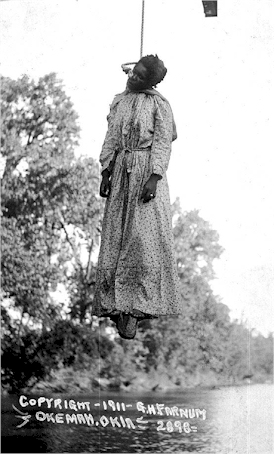
Lynching is a terroristic tactic used by Democrats (primarily in the South) to murder Blacks and Black sympathizers. Republicans tried very hard to pass anti-lynching legislation. The legislation was routinely filibustered and died on the U.S. Senate floor.
Former President Lyndon Baines Johnson had voted against anti-lynching legislation (as well as laws to abolish the poll tax, civil rights bills, and the Fair Employment Practices Commission - to address racism in the workplace) when he was in the U.S. House of Representatives and in the U.S. Senate. Southern Senators organized what was called the “Southern Bloc”. This Group of legislative terrorists were led by Democrat Richard Russell of Georgia and J.W. Fulbright of Arkansas. They organized the most elaborate filibusters against anti-lynching and Civil Rights legislation ever seen on the floor of the U.S. Senate. Other tactics included adding amendments to legislation that would kill the Bill either in the Senate Committee or on the Senate floor.
That Southern Bloc formed the unofficial planning committe for Lyndon Johnson's eventual run for President in 1960. This group was so formidable that only time slowed them down.
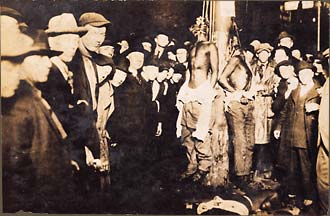
The lynching of 19 year-old Elias Clayton, 19 year-old Elmer Jackson, and 20 year-old Isaac McGhie. June 15, 1920, Duluth, Minnesota.
(An Actual Photo with faces of the lynching Democrat terrorists clearly seen)
“Uncle Tom”
Most Blacks understand the term “Uncle Tom” to be any Black person that seemed to “sell out” to white [Republican] people in authority. First as the title character in Harriet Beecher Stowe's novel, Uncle Tom quickly became a pejorative against Black males. Black women were the first to use the term to describe Black men who left the Republican Party to join the Democratic Party. Marcus Garvey is the first public figure to call Black Democrats Uncle Toms. As a matter of fact, one of the best known figures that Garvey called an Uncle Tom was W.E.B. Dubois. Dubois was very criticle of the “Back to Africa” led by Garvey's United Negro Improvement Association (UNIA). Garvey called Dubois an Uncle Tom. Dubois responded by calling Garvey the most dangerous Black man in America.
Garvey followed with calling Dubois “purely and simply a white man's nigger”. Marcus Garvey's main idea of Pan-Africanism was that Blacks needed to be entreperneurs and establish relationships with African countries. Former slaves learned such skills as commercial farming, irrigation, and land development that would be crucial to societal advancements in the “Motherland”. Garvey also called the NAACP the “white man's organization with no real intention of helping Blacks.” Dubois's association with the NAACP (being founded largely by white money) hurt him with Blacks as well due to the fact that between 1910 and 1917, Dubois was the only Black officer of the organization.
The most unusual phenomena about the term “Uncle Tom” is that it is currently directed to Black Republicans and not Black Democrats even though the ideas of these Black Republicans has not changed since the abolition of slavery.
40 Acres and a Mule
Officially named: Special Field Order No. 15
Republicans gave reparations of 40 acres and a mule to former Slaves. Democrats repossessed reparations of 40 acres and a mule from former Slaves! Republicans, led by Republican President Abraham Lincoln, discussed reparations to former Black Slaves immediately after Republicans defeated Democrats in the Civil War. On January 12, 1865, shortly before the end of the Civil War, General William Tecumseh Sherman and the Secretary of War, Edwin M. Stanton, met with twenty Black community leaders in Savannah, Georgia to discuss freedom and reparations for former Black Slaves.
The leaders expressed a need for land and a separate Black State. As a result of this meeting, on January 16, 1865, General Sherman issued Special Field Order No. 15, which set aside 7,600 square miles in a 30-mile wide tract of land (inland from the sea) along the Atlantic coast stretching from Charleston, South Carolina South to St. John's River near Jacksonville, Florida, for the exclusive settlement by Blacks. This area of land included all of the islands along the coastline between Charleston and St. John's River. The Field Order also guaranteed former Slaves U.S. military protection, 40 acres of tillable land per Black family, other provisions such as a mule or horse in order to work the land, and any other animal that was no longer useful to the military. By June 1865, over 40,000 former Slaves people were settled on 40 acre tracts of land. Over 400,000 acres were allocated.
In September of 1865, Democrat President Andrew Johnson reversed Field Order No. 15, issued special pardons and returned the land to former Slaveowners. Subsequent to Johnson's repeal, U.S. Rep. Thaddeus Stevens, a Pennsylvania Republican, proposed the 40 acres plus $100 to build a house. The military would loan a mule to work the land. The legislation was defeated in Congress on February 5, 1866 by a vote of 126 to 36.
Poll Taxes, Black Codes, Literacy Tests...Then Jim Crow
After the losing the Civil War, Democrats had to devise other methods to restrict and control the lives of Blacks. Republicans passed the 13th, 14th and 15th Amendments to the U.S. Constitution, The Sherman Act (a.k.a 40 acres and a Mule), and the Civil Rights Acts of 1870, 1871, and 1875. Democracts devised subversive schemes to restrict Blacks “Post-Slave” status. Democrats even took advantage of “The Compromise of 1877” which was an agreement settling a political dispute awarding a Presidential election to Republican Rutherford B. Hayes over Democrat Samuel J. Tilden. Republicans proposed that if the Democrats conceded defeat for the White House, the Republicans would agree to pull U.S. troops out of the South. This agreement ended federal “Reconstruction” in the South. By 1877 Blacks were participating in almost all levels of State and Federal Government. After 1877, Democrats strategically regained political power in the South and implemented schemes such as the following: Literacy tests required Blacks to learn to read in order to vote - despite the fact that huge populations of whites at that time could not read nor write, but were allowed to vote.
Black Codes was a system of labor control that looked like slavery. Blacks were coereced into signing long and lop-sided labor contracts. Black Codes empowered local law enforcement authorities to arrest and fine Blacks who refused to sign these contracts. Educated Blacks refused to sign these contracts and were routinely jailed and fined. Poll Taxes required Blacks to pay a certain amount of money to the local treasury before voting.
Jim Crow was a set of codes, statutes, laws, rules, and customs developed by Democrats to continue to disenfranchise Blacks. These codes, statutes, laws, rules, and customs were very sophisticated in how they survived legal scrutiny. In some cases they were blatant violations of the law, but most were difficult to combat with existing laws. The Voting Rights Act of 1965 addressed those issues that u;timately “Executed” Jim Crow. Republicans responded with a second emancipation effort of Blacks in the South. Impressive attempts to propose anti-lynching statutes failed due to a caucus of Democrats called the “Southern Bloc”. The Southern Bloc used various congressional rules to block the passage of any legislation that Benefited blacks. Republican ultimately defeated Democrats with the passage of the Civil Rights Acts of 1957, 1960, 1964, and the Voting Rights Act of 1965.
Three-Fifths a Person
(a.k.a. Federal Ratio)
Representatives and direct Taxes shall be apportioned among the several States which may be included within this Union, according to their respective Numbers, which shall be determined by adding to the whole Number of free Persons, including those bound to Service for a Term of Years, and excluding Indians not taxed, three fifths of all other Persons.
Article I, Section 2, Clause 3 of the Constitution of the United States of America
It is a common belief in the Black community to believe that Whites in the United States believed that simply declared Blacks were only 3/5 human. The reality is that No one ever considered Slaves to be only 3/5 human! They knew they enslaved whole humans! As a matter of fact, states such as North Carolina wanted their slaves to be counted as the "whole humans" they were. The 3/5 of a person myth was really a legislative compromise between legislative proposals by pro-slavery representatives and anti-slavery representatives in the Constitution Convention. That compromise was officially called the 3/5 Compromise. Once the 3/5 Compromise was used by the government, it was called the Federal Ratio.
By 1860, 500,000 free Blacks lived in the United States. This is before the Civil War, all of the federal Civil Rights and Affirmative Action Laws, and the Emancipation Proclamation. Also by 1860 free Blacks in the Confederate South owned between 9 and $15 million worth of property (that's about $225 and $375 million in today's value), more than most Southern whites and nine times as much as free Northern Blacks. They were all counted as whole persons just like whites, not 3/5 a person! Ever since 1611, the issue of slavery was an emotional, and sometimes violent, debate in early America. Abolitionist organizations were challenging the nation in 1619 when the first slaves were shipped to the colonies. By 1783, after America won its independence from Britain, the Continental Congress (the federal governing body at that time) debated federal representation in the Continental Congress, federal taxation, and the spread of Slavery.
Southern representatives proposed a scheme to count Slaves as part of the citizen population when deciding the number electors from each jurisdiction in the Continental Congress, but not be counted for tax obligations. Northerners realized that this evil proposal was designed to inflate Southern representation in the Continental Congress and stop the ever-growing anti-Slavery forces from successfully abolishing slavery. So Northerners proposed counting slaves for taxing and not for representation. Northerners knew that if they were successful at not counting slaves for representation, eventually they would have enough representation in the Continental Congress to abolish slavery and welcome them to the citizenry. Southern representatives threatened not to join a “Union of States in the Americas.”
Some Northerners wanted to go to war over the issue. Representatives then began debating ratios of free people to slaves. James Madison proposed a ratio based on a middle-grown compromise of those ratios being debated - 3 free persons to 5 Slaves. It was also rejected and the the Continental Congress recessed with out an agreement. In 1787, members of the Continental Congress secretly convened a Constitutional Convention. They began writing the Constitution of the United States of America. During the debates, this issue of representation, taxation, and slavery resurfaces. The Madison proposal of 1783 was reintroduced by Alexander Hamilton and accepted by the Convention.
During the first census in 1790 there were 59,000 free blacks living in the United States -- approximately 27,000 in the North and 32,000 in the South. Free Blacks were not subject to the Three-Fifths Compromise. They were counted as whole, free persons along with whites. After the ratification of the U.S. Constitution, states, territories, and people all over the United States took aggressive measures to ban Slavery in America. Finally, Republicans defeated Democrats in a Civil War.
Every person from Thomas Jefferson to James Buchanan was elected President as a result of the 3/5 Compromise. Abraham Lincoln was the first person elected president without the advantage of the 3/5 Compromise. He was also the first Republican elected President and the first anti-Slavery President.
The First Black Republicans...
Black America was once faithful and very supportive members of the Republican Party Blacks began serving in the United States Congress in 1869. Besides them were the thousands of Blacks who were elected to state and local offices. Blacks were more numerous than whites in many state legislatures. For example, in the early 1870's there were 87 Blacks in the South Carolina legislature as opposed to 40 Whites. Blacks had almost as much representation in some other states. Here are a few firsts in Black History.
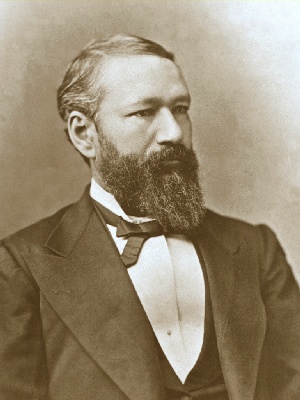 |
Pinckney Benton Stewart (P.B.S.) Pinchback (who was Lieutenant Governor) served as the 1st Black to serve as Governor of any state. He was Governor in Mississippi from December 9, 1872 to January 13, 1873. Pinchback had also served as a member of Congress.
|
|
Not Yet Pictured
|
Oscar J. Dunn was the first Black Lieutenant Governor in the United States. Dunn was elected June 13, 1868 as Lieutenant Governor of Mississippi. He served until his death November 22, 1871. P.B.S. Pinchback finished Dunn's term.
|
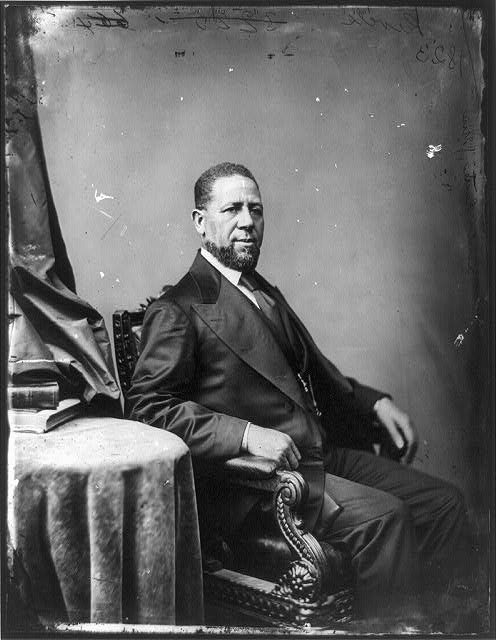 |
Hiram Rhoades Revels was the 1st Black to serve in the United States Senate (1870 - 1871). He was a Republican from North Carolina. |
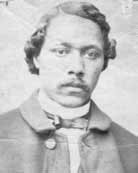 |
Ebenezer Don Carlos Bassett was the first Black to receive a U.S diplomatic appointment. In 1869 he was appointed US Minister to Haiti. |
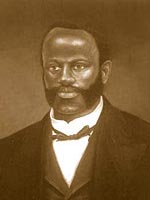 |
Jonathan Jasper Wright was the 1st Black State Supreme Court Justice in U.S. history. Justice Wright was elected to the South Carolina Supreme Court on February 1, 1870 and served until his resignation December 1, 1877.
|
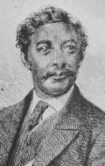 |
John Willis Menard of Louisiana was the first Black elected to Congress. Congressman Menard was but is denied a seat. The loser challenged his victory in the U.S. House of Representatives. When he spoke before the Congress, he became the first Black to speak on the floor of the Congress.
|
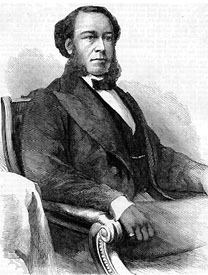 |
Joseph H. Rainey was the 1st Black sworn in as member of U. S. House of Representatives. December 12, 1870. |
Thurgood Marshall
Associate Justice
United States Supreme Court
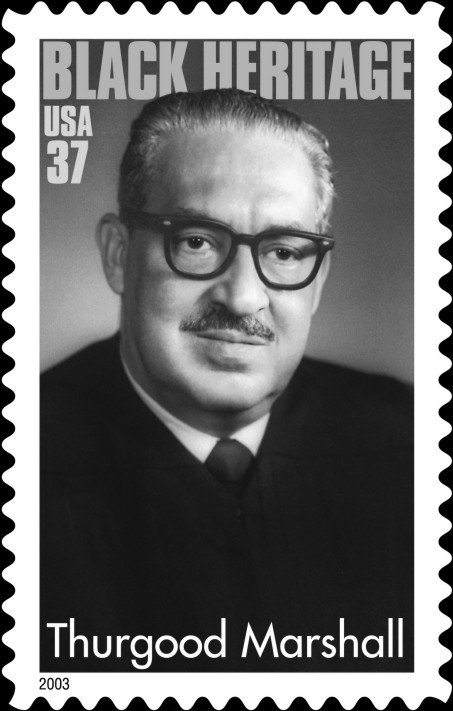
Thurgood Marshall was sworn in as the first Black man to the U.S. Supreme Court on October 2, 1967. Democrats were angry with President Lyndon B. Johnson for even making the nomination and refused to support Marshall's nomination. Republicans, adhering to their long tradition of providing opportunities to Blacks, aggressively supported this Black man and voted almost unanimously to ensure Thurgood Marshall's place in history. Here is the breakdown of the vote:
|
Possible Votes
|
Yes
|
No
|
Didn't Vote
|
|
|
Democrats
|
64
|
37
|
10
|
17
|
|
Republicans
|
36
|
32
|
01
|
03
|
|
Total
|
100
|
69
|
11
|
20
|
If left up to Democrats, Blacks would not be celebrating Thurgood Marshall as Associate Justice of the United States Supreme Court. Republicans made this monumental effort even though Blacks, since the infamous 1964 Presidential Election, were no longer voting Republican. Democrats worked very hard to prevent Marshall's confirmation. Only 37 of the 64 U.S. Senate Democrats voted for Thurgood Marshall. the number of Senators needed to confirm a nominee for any position in Government is 51. So surely, if Democrats wanted to confirm him, they didn't need Republican votes to do so. Democrats had already performed in a similar segregationist fashion in 1961 when President John F. Kennedy appointed Attorney Marshall to the United States Court of Appeals for the Second Circuit. Here is the breakdown of the vote:
|
Possible Votes
|
Yes
|
No
|
Didn't Vote
|
|
|
Democrats
|
63
|
29
|
16
|
18
|
|
Republicans
|
37
|
25
|
00
|
12
|
|
Total
|
100
|
54
|
16
|
30
|
In 1965, after exaustive debates over the recently passed 1964 Civil Rights Act, the 1965 voting Rights Act, and the election of President Lyndon B. Johnson to his first full term as President, the nomination and confirmation Judge Thurgood Marshall to be Solicitor General of the United States (The U.S. Government's chief litigator in the United States Supreme Court) was a voice vote.
On Tuesday, January 07, 2003, the U.S. Postal Service honored Justice Marshall with a commemorative stamp bearing his image - one of many honors bestowed upon him. To date, the Republican Party has never been appreciated for their participation in Marshall's historic life.
Barry Goldwater
Republican
United States Senator, Arizona
Founder, N.A.A.C.P. Arizona
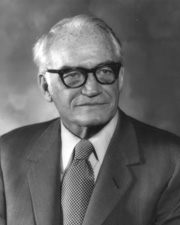
Barry Goldwater is often referred affectionately as the “father” of the modern conservative philosophy. Democrats have demonized him as a racist. What Democrats don't say is that Goldwater spent his entire life advancing Civil Rights in the United States. When Senator Goldwater was a City Councilman in Phoenix, Arizona (in the 1940's and 50's), Goldwater was a founding member of the Arizona NAACP. He remained a member of the NAACP until his death in 1998. As Chief of Staff in the Arizona National Guard, then U.S. Air Force Colonel Goldwater desegregated the Arizona National Guard - 2 years before President Harry S. Truman desegregated the U.S. Armed Forces!! Goldwater desegregated the Family Business (the Goldwater Department Stores, later bought by Robinsons-May Stores, then later bought by Macy's Department Stores), while serving as its CEO, as a Phoenix City Councilman Goldwater desegregated the Phoenix Public Schools. As U.S. Senator, Goldwater voted for the 1957 Civil Rights Act and for the 1960 Civil Rights Act while Democrats (including those who are beloved and revered to this day) voted against both Acts. His First Senate Staffer was a Black woman lawyer. Barry Goldwater's history in advancing the rights of Blacks in this nation is much better than any Democrat elected official discussed in this booklet.
The Racist History of Gun Control
The 1st gun control law on American soil was passed in 1644 by the Virginia colony this law barred both free and enslaved blacks from owning firearms. Their reasoning was based on safety within the colony. The colonies began enacting similar legislation. The very first gun control law passed since the Constitution of the United States was called The Militia Act of 1792. It was passed just months after ratifying the Bill of Rights. Part of its intent was to disarm Black Slaves and limit the application of the 2nd Amendment to Free Blacks. One of the biggest debates surrounding the Civil Rights act of 1866 and the 14th Amendment was the fact that it would override gun control laws in the states and allow the 2nd Amendment to fully apply to all Blacks (free and formerly enslaved). The National Firearms Act of 1934 was America's first gun control law at the federal level.
Government dictatorships used gun control to control and genocide citizens as well. From 1915-1917, the Turks disarmed and murdered 1.5 million Christian Armenians. The Armenians had no human rights; they were slaves. In the 1920's through the 1940's, Soviet Leaders Vladimir Lenin and Joseph Stalin disarmed the citizens of the Soviet Union and murdered over 20 million of their own people. In the mid-1970's, Pol Pot, Cambodia's Communist Dictator, committed genocide on one million Cambodian adults in an effort to cleanse opposing thoughts. Saddam Hussein disarmed the Kurds and slaughtered thousands throughout the 1990's.
The Communist Rwandan Government committed genocide on 500,000 people of the Tutsi tribe under gun control laws in the 1990's as well. Adolph Hitler's Nazi Weapons Law of March 18, 1938, prohibited Jews from owning firearms - making way for their genocide. This Law was also imposed on all German citizens, but gave complete exemption to Nazi Party members.
The U.S. Gun Control Act of 1968 was introduced by the late and former United States Senator Thomas Dodd (Democrat of Connecticut). Senator Thomas Dodd was the father of current United States Senator Christopher Dodd (Democrat of Connecticut). Senator Dodd used the Nazi Weapons Law of 1938 as his guide to write his Bill. He learned of this law when he was on the U.S. team that helped to prosecute Nazi war criminals at Nuremberg, Germany, in 1945-46. Dodd requested the Law Librarian at the Library of Congress, Lewis C. Coffin to translate the German written Nazi Weapons Law into English.
The Dodd subcommittee proposed to require the registration of firearms (S.3604), to disarm lawless persons (S.3634), and to provide for the establishment of a National Firearms Registry (S.3627). At the Dodd hearings, Rep. John Dingell (Dem-Michigan, still serving), expressed concern that firearms registration might lead to confiscation of firearms, as had happened in Nazi Germany. Sen. Joseph Tydings (D-MD) angrily accused him of using scare tactics. Dingell backed down. Niggertown Saturday Night Special was the original slang title used by Democrats in the South to describe cheap guns used by blacks for protection in the segregated South. The name “Niggertown” was eventually dropped but attempts to keep guns from the Black community still exist.
Fredrick Douglass
Republican
Former U.S. Marshall, Washington, D.C.
Former Slave
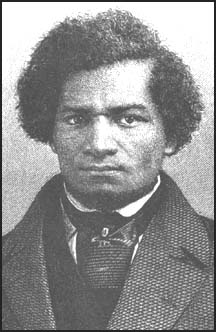
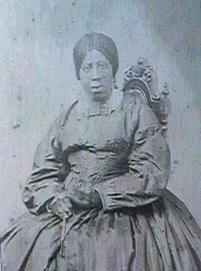
The Young Fredrick Douglass is pictured above with his first wife...a Black woman named Anna Murray Douglass.
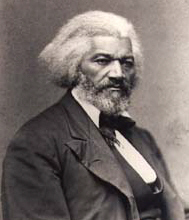
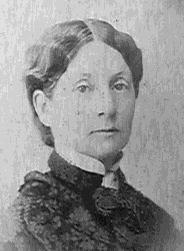
The Old Fredrick Douglass is pictured above with a picture of his second wife...a White woman named Helen Pitts Douglass. Fredrick Douglass married again after Anna died. Fredrick remained married to Helen until he died.
Why Blacks Left the Republican Party
(1852 - 1967)
From Republican To Democrat
Blacks began noticeable change in their political allegiance from the Republican Party to the Democratic Party in about 1934 with the Defeat of Black Republican Oscar DePriest, Congressman of Chicago’s South Side. Congressman DePriest was the first Black elected to Congress in the 20th Century. Black Democrat Arthur Mitchell defeated him.
The key to Congressman Mitchell’s victory was that he was supported by labor unions, a powerful political interest in the Democratic Party. Originally the Democratic Party prohibited Blacks from joining and former Slaves had no interest in a political allegiance with their former Slave masters. However, Blacks since Emancipation wanted high paying jobs at the many shops, stores, factories, plants, and firms who paid very high wages compared to what they were earning on farms. The only problem was that employment in these shops, stores, factories, plants, and firms was controlled by labor union contracts and labor unions either actively discouraged or expressly prohibited Blacks from labor union membership.
Many Blacks gained employment in these industries by being replacement workers to striking unions. As replacement workers, Blacks became expert meatpackers, coal miners, automobile manufacturers and many other industry professionals. Unions, in order to remain effective were forced by circumstance to open their membership to Blacks.
When Roosevelt's “New Deal” began in 1933, companies with labor union contracts were the priority recipients of government work contracts. Blacks were heavily influenced by fellow union members (in some cases coerced) and began re-registering as Democrats. Unions had even begun donating to the NAACP in order to keep union pressure on Blacks to join the Democratic Party and remain active union members. In the South of course, the Democratic Party banned membership of Blacks but in the North Blacks re-registered as Democrats in large numbers. Blacks found themselves suddenly campaigning for Democrats, giving money to Democrats, and opposing the very Republican Party that had just recently shed blood to free Blacks as Slaves. Black women were offended by this political change, calling men who changed their affiliation from Republican to Democrat “Uncle Toms”. Black Nationalist Marcus called W.E.B. DuBois an Uncle Tom when he changed his Party.
This political momentum built slowly through the 1930’s, 40’s and 50’s. There was even a time when political muscle was flexed:
In 1947, Black Union Leader A. Phillip Randolph clashed with President Harry S. Truman over civil rights for African Americans. President Truman called for a peacetime draft, but failed to include a provision against segregation. Randolph founded the Committee Against Jim Crow in Military Service and Training. Within a year, the group became the League for Non-Violent Civil Disobedience Against Military Segregation and called for Blacks to refuse to register for the Draft or refuse to serve if called. Truman met with Randolph and other African-American leaders, but refused to be persuaded.
Randolph later testified before the Senate Armed Services Committee and continued to pressure Truman. Finally Truman relented and issued an executive order barring discrimination in the military on July 26, 1948. Believing they had achieved their purpose, Randolph called off the non-violent civil disobedience campaign.
The Nitrogen boost to that momentum away from the Republican Party was in the 1960’s when Pastor Martin Luther King, Sr. withdrew his political endorsement of then Republican Vice President Richard M. Nixon for President in 1960 to then Democrat New York Senator John F. Kennedy for President. The next event that sealed the fate of the Black vote was the 1964 presidential election when long-time Civil Rights Activist, Republican Arizona Senator, Barry Goldwater decided to vote against the Civil Rights Act of 1964 and Campaign for President based on that decision. Ever since then, Blacks have been voting well over 90 percent Democrat.
Republicans Never gave up on Blacks
When the Republican Party first came into power in 1860, they really had only two issues on the table…the abolition of Slavery and the enfranchisement of former Slaves into the Union. After the negotiated end to Federal reconstruction in the South in 1977, the agenda for the Republican Party increased dramatically to include such issues as workers rights, commerce, education, segregation, lynching, and foreign policy.
From the 1880’s to 1950, the Republican Party led valiant efforts to pass Federal anti-lynching legislation. Republicans never got one piece of legislation passed due to the successful and dastardly efforts of the Democrats in the U.S. Congress.
Republicans found themselves in a precarious situation. As they were fighting to pass Anti-lynching legislation, Blacks were leaving the Republican Party and joining the Party whose members either participated in lynchings or sympathized with those who did participate in lynchings. Republicans were having to battle against Blacks in when it came to economics because union leadership (and therefore the union as a whole) became a near exclusive supporter of the Democratic Party. Republicans are now fighting for the Civil Rights of those the very Blacks that they oppose on labor issues in America. Democrats are receiving increasing political support from these Blacks even though they were oppressing Blacks with Jim Crow. Because of this changing political dynamic, the issue of Civil Rights became less about humanity, liberty, and freedom and became more about entitlements. The Republican Party position is that no level of government should engage in entitlement spending. However, the timidity of the Republican Party to assert a challenge to that dynamic and return the debate back to Civil Rights as an avenue to humanity, liberty, and freedom has now caused the Republican Party to seem as though they are against the further advancement of Civil Rights.
Republicans hit a major stump when they nominated Arizona Republican Barry Goldwater to the 1964 Republican Nominee for President. Although he had an excellent record on Civil Rights issues for Blacks, he blundered when he voted against the Civil Rights Act of 1964. Blacks left the Republican almost completely at that point and have never returned since then. Republicans tried to regain Black support when they secured the confirmation in 1967 of the appointment of Thurgood Marshall (then Associate Judge of the United States Court of Appeals for the Second Circuit) to be the 1st Black to serve on the United States Supreme Court. Blacks celebrated Justice Marshall’s elevation, but it was not enough to convince Blacks to return to the Republican Party. After 115 years of fighting for Black enfranchisement in America, Justice Marshall’s confirmation would be the last major attempt that the Republican Party would organize to specifically target the upward mobility of Blacks in America.
Citations:
Thomas C. Fleming writings, Library of Congress, Wikipedia.org, wallbuilders.com, aphiliprandolphmuseum.com, aframnews.com.
"This country must remain a Christian nation because only a Christian nation can ensure that a people who live in its borders are free as individuals from foreign aggression and domestic persecution"
For questions and/or comments regarding this article please email me
mdcurrington@yahoo.com